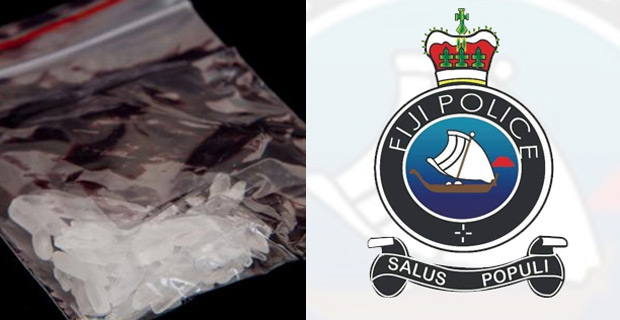
Fiji faces a growing concern with drug dealing and consumption, particularly methamphetamine, also known as the "zombie drug." Police report increasing cases and significant seizures of hard drugs. The drug's availability is linked to rising violence and addiction issues. Authorities emphasize the need for more drug rehabilitation centers and public awareness to combat this crisis.
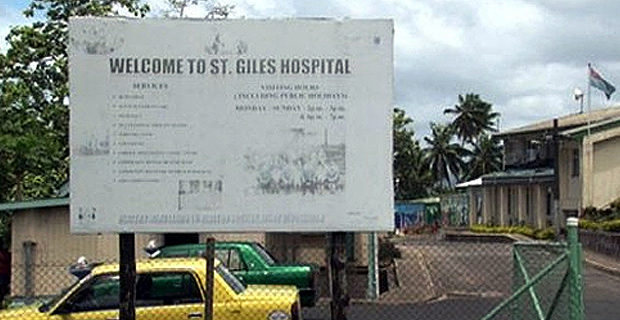
There is no specific drug rehabilitation centre in Fiji dealing with the increasing number of people using hard drugs.
Although Saint Giles Hospital has been dealing with victims of substance abuse, Deputy Secretary for Defence and National Security, Lieutenant Colonel Ilai Moceica says Saint Giles Hospital is not specifically looking at substance abuse.
According to Moceica, 100 of more than 500 patients were admitted at Saint Giles Hospital between May 2017 to April 2018 due to substance abuse.
Speaking at the Narcotics Workshop in Suva, Moceica says statistics reveals that the most common substances abused are marijuana, methamphetamine, cigarettes, kava and alcohol.
Moceica says the Fiji Police can only do so much in such efforts to addressing the drug problem in Fiji.
He says stakeholders need to holistically view this as a national problem and this forum is rightfully mandated to come up with strategic solutions that would not only allow enforcement agencies to curb the illicit use of drugs and eradicating cultivators but to commit our resources and time to this worthy cause.
Moceica says the 2018 World Drug Report states that the markets of cocaine and methamphetamine are extending beyond their usual regions, which more psycho-active substances are being synthesized and available more than ever before.
He says in the Pacific context, Fiji only has to look at it’s neighbours to see how the illicit drug trade is having a devastating and often deadly effect on innocent lives.
Moceica also says that life is a precious commodity that government officials are entrusted to protect and it is the responsibility that they should not take lightly.
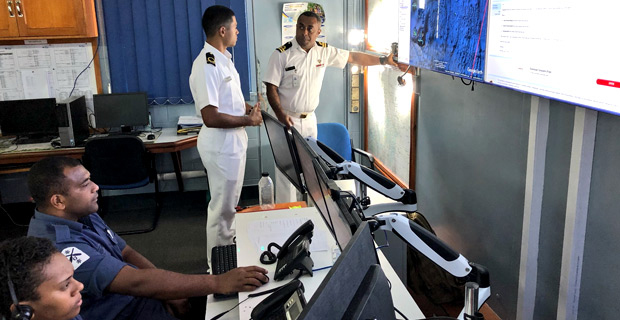
The Fiji Navy through the Maritime Surveillance and Rescue Coordination Centre and patrols is actively working to identify vessels that are ‘high value targets’ for bringing hard drugs into the country and is sharing that information with Police and the Fiji Revenue and Customs Service.
The Fiji Maritime Surveillance and Rescue Coordination Centre has state of the art technology that allows it to monitor what is coming into Fiji waters and also help in search and rescue operations.
Centre Director, Lieutenant Sairusi Colati says they do have indications that drugs are coming in through yachts from international waters and share this information with Police and the Fiji Revenue and Customs Service.
There have been numerous cases where cocaine and methamphetamine have been found on yachts in Fiji waters.
One prominent case is where Australian national, John Nikolic was jailed last year for importing 12.9 kilograms of cocaine and 34.4 grams of methamphetamine with an estimated value of $30 million.
In March this year, Police through the help of a member of the public found an underwater transponder in the Lomaiviti Group within the range of an area where drugs had been found.
A dive team led by Police Commissioner Sitiveni Qiliho searched the area after suspecting the underwater transponder may have been allegedly used to give coordinates for a drop off and pick up point for drugs.
Lieutenant Colati says they are also conducting patrols out at sea when they get certain indicators and that has previously led to some successful seizures which included the discovery of parcels of cocaine in coastal areas.
In August last year at least 89 bars of cocaine were found in the Lau Group, Savusavu, Taveuni and Lomaiviti.
45 bars were found in Lau, 7 bars in Taveuni, 1 bar in Savusavu and 36 bars in Lomaiviti.
Authorities have also engaged the help of village headmen in coastal areas.
Lieutenant Colati is part of a Narcotics Workshop at Tanoa Plaza Hotel in Suva this week which will address all aspects of the worldwide drug problem but with solutions specifically for Fiji.
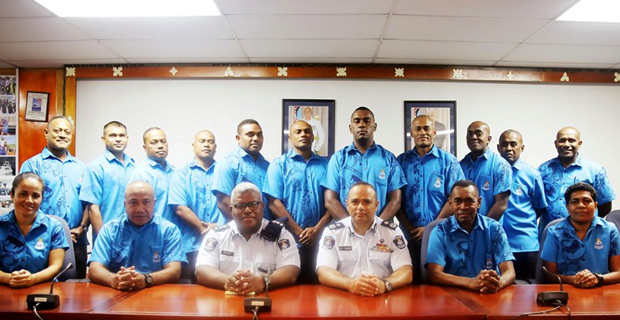
The Commissioner of Police Sitiveni Qiliho says they can’t allow Fiji to fall into drugs and they are in a position to do something about it now.
He adds the impacts of drugs on a small country like ours will be devastating, productive people will become unproductive and the strain on our health system and the strain on our economy will be huge.
Qiliho was speaking to a delegation of fifteen Police Officers who will be leaving tomorrow to attend a two-week anti-narcotics training in the People’s Republic of China’s top institutions.
He added the demand for, and the over production of drugs in South America has led to the increase in the movement of drugs through the Pacific.
He stated that he understands that they won’t be able to fully eradicate it, but they can however manage it and its impacts on our society and going to Yunnan Province is part of the battle.
He further states Australia and New Zealand have tightened their battle on their home front, as have we, and there is a likelihood that it will affect our neighbouring countries since these drugs are being pushed through our oceans and a few kilos will be dropped off as payment, and then sold into our society to feed our users.
Qiliho says our counterparts from the Australian Federal Police have also attended training in Yunnan to help them fully understand the evolving nature of how criminals are trying to beat the system from moving the more solid form of the drugs in order to beat detection systems.
Qiliho says it is imperative that the officers to utilize the valuable learning opportunity well.
The delegation will be led by the Officer in Charge of the Fiji Police Drugs Unit ASP Anare Masitabua and comprises of officers from the Criminal Investigations Department, Crime Intel, Forensic and Prosecutions.
The two opportunities for training with the Yunnan Police College resulted from a visit made by the Commissioner of Police to the Institute in May last year where discussions were held with the Yunnan Police Public Security
The Yunnan Police Public Security Bureau is the leading province in China dealing with Narcotics.
The Fiji Police Force has benefitted greatly since the signing of a Memorandum of Understanding in 2011 between the Fiji’s Ministry of Defense and National Security and China’s Ministry of Public Security.
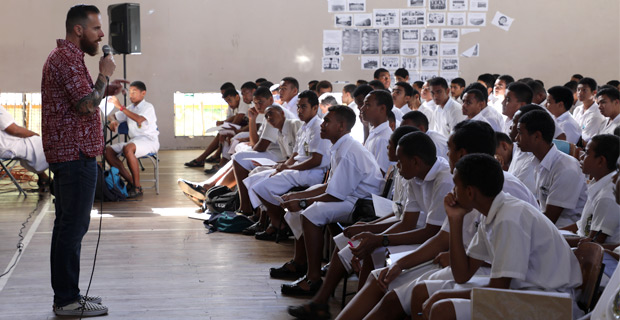
Students of Marist Brothers High School today pledged to say no to drugs after hearing and seeing stories of the unimaginable things teenagers have done to themselves due to methamphetamine and ecstasy addiction.
The drug awareness session which was conducted by Special Agent Billy Lewis of the US Embassy Regional Security Office also got parents to share their experiences with the students.
One parent talked about how she was helping a 16-year-old deal with his addiction to methamphetamine.
Special Agent Lewis also told students about the gruesome stories of what people that have been addicted to drugs like meth and ecstasy go through.
1,634 cases of drugs and substance abuse in schools was recorded by the National Substance Abuse and Advisory Council last year.
There were 417 cases recorded in primary schools while 1,217 cases were recorded in secondary schools.
The National Substance Abuse and Advisory Council says the most number of cases were from schools in Suva which was 434 cases.
738 of the cases involved students smoking cigarettes, 301 of the cases involved students sniffing glue while there were 118 cases of students smoking marijuana.
There were 11 cases of secondary school students dealing drugs in schools.
The data in the International Day Against Drugs Abuse and Illicit Trafficking Booklet was gathered through evaluation forms submitted by 796 primary and secondary schools in Fiji.
The submission rate was 87.5 percent.
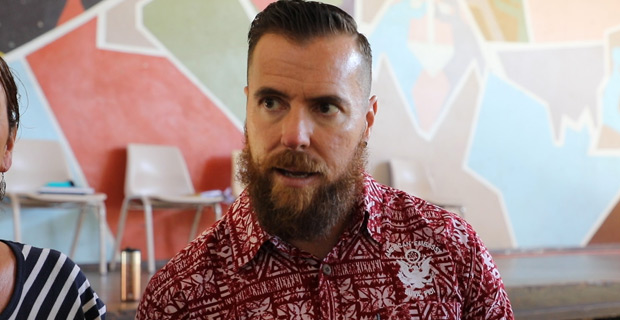
The possibility of an explosion happening during a raid at a meth lab or exposure to harmful chemicals are some of the situations Police officers in Fiji are now preparing to face.
The US Embassy, Australian Federal Police and New Zealand Police are supporting the Fiji Police Force in this area.
Special Agent Billy Lewis of the US Embassy Regional Security Office says its very rare but its becoming apparent that Fijians and other nationals want to cook meth in Fiji.
Special Agent Lewis who has been based in Fiji for three years says he has been extensively working with speciality units within the Fiji Police Force especially the newly commissioned Southern Division Taskforce.
In February this year, Police found a meth lab in a nightclub in Nadi while small scale meth labs were also found in 2013 in Nakasi and 2015 in Valelevu.
A huge methamphetamine factory was also found in Laucala Beach in 2004 and at the time Police said the chemicals found in the warehouses was enough to produce 2,200 pounds of crystal methamphetamine.
Last year in September, 40 police and customs officers were part of a U.S. Drug Enforcement Administration (DEA) training.
In that training, participants shared best practices for investigating and searching laboratories, identifying chemical product supplies used for the production of illicit drugs, and techniques for safe processing of evidence.
The participants also learned how to properly use Personal Protective Equipment during drug investigations and seizures.
Special Agent Lewis conducted a drug awareness session with students of Marist Brothers High School today.
At the session, parents also got to share their experiences with the students.
One parent talked about how she was helping a 16-year-old deal with methamphetamine addiction.
Special Agent Lewis also told students about the gruesome stories of what people that have been addicted to drugs like meth and ecstasy go through.
1,634 cases of drugs and substance abuse in schools was recorded by the National Substance Abuse and Advisory Council last year.
There were 417 cases recorded in primary schools while 1,217 cases were recorded in secondary schools.
The National Substance Abuse and Advisory Council says the most number of cases were from schools in Suva which was 434 cases.
738 of the cases involved students smoking cigarettes, 301 of the cases involved students sniffing glue while there were 118 cases of students smoking marijuana.
There were 11 cases of secondary school students dealing drugs in schools.
The data in the International Day Against Drugs Abuse and Illicit Trafficking Booklet was gathered through evaluation forms submitted by 796 primary and secondary schools in Fiji.
The submission rate was 87.5 percent.
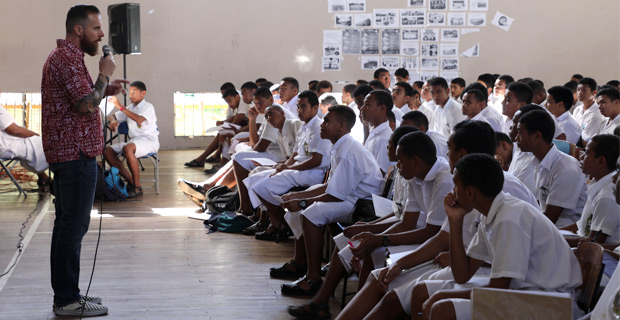
Prime Minister, Voreqe Bainimarama says hard‑core synthetic drugs have no place in Fiji, they damage communities, they ruin lives, and they can result in devastating spill‑over effects of violence.
Bainimarama has also said good on you, to the students of Marist Brother High School who have taken a pledge to say no to drugs.
Bainimarama says curbing the abuse of hard drugs in Fijian society starts with personal responsibility.
He says by saying "NO" to drugs like methamphetamine and ecstasy the students are setting a positive example for young people everywhere to follow.
Bainimarama says the government shares this commitment, and they are seriously stepping up the campaign to get drugs off the streets and put drug traffickers behind bars.
The Prime Minister says in the last National Budget, they allocated $800,000 to fund a stronger effort to combat drug trafficking, with dedicated staff in the Fiji Police Force tasked with finding and rooting out networks of hard and synthetic drug dealers and suppliers. He says these officers will work closely with their counterparts in Australia and New Zealand.
Bainimarama says drugs in Fiji are often smuggled in via boat from overseas. He says they have also allocated $720,000 towards the purchase of four new intercept boats for the police to strengthen law enforcement's presence in Fijian waters.
The Fiji Navy will also be providing the Police with additional personnel and vessels to assist with maritime surveillance, with a $1.1 million allocation set aside to fund personnel costs aboard two new vessels, the RFNS Volasiga and the RFNS Savenaca.
Bainimarama has made a call to encourage more young people to make this same pledge, say "NO" to drugs and build a healthier and safer Fiji.
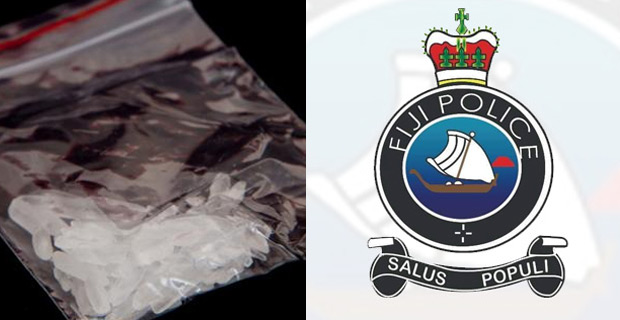
Officers from the Fiji Revenue and Customs Service and the Criminal Investigations Department arrested a woman this morning for allegedly importing 115 grams of methamphetamine valued at $115,000 through Parcel Post.
The drugs which were concealed inside a bottle of peanut butter arrived from the United States of America to Nadi on Wednesday and was addressed to a local person.
Customs Officers at the Parcel Post scanned the consignment and discovered the white powder which was later tested positive for methamphetamine.
CEO Visvanath Das says the parcel was then sent to the Suva Post Office through control delivery and officers arrested the woman when she came to pick the parcel today. Das says the social cost associated with the hard drug is estimated to be around $210,000.
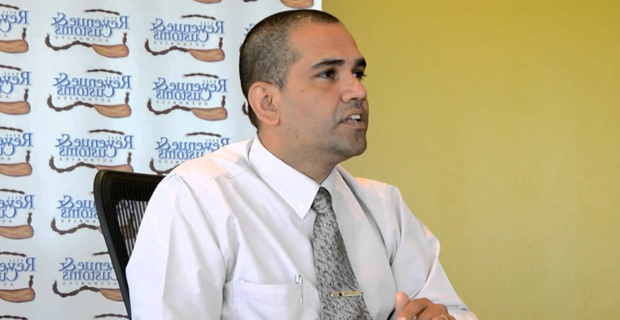
He says they are also maintaining close contacts with local and overseas enforcement agencies to strengthen intelligence exchange to combat the smuggling activities.
Police Commissioner Brigadier General Sitiveni Qiliho is pleased that the partnership with other law enforcement agencies continue to produce positive results.
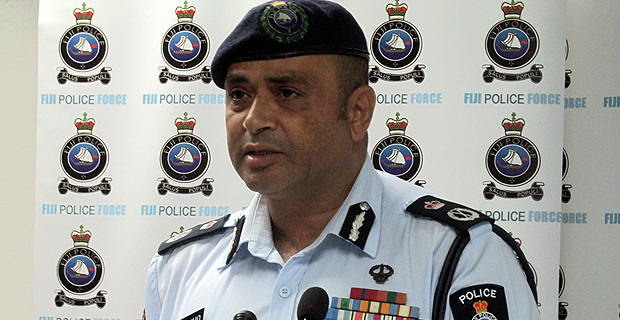
Qiliho says whether it’s a few grams or kilos, every seizure counts. He says if they are able to prevent one more innocent life from the harmful effects of the illicit drug trade, that in itself is a major victory for law enforcement.
The Police Commissioner says methamphetamine is being glamourized from what people watch on television and in the movies.
He says the truth is that it is a danger to everyone in society, and a recent example was shared by a mother who said she knows and is in contact with a 16 year old boy who has dropped out of school, assaulted his mother and sister, and stabbed his brother because of his addiction which is why we cannot allow Fiji to fall into drugs, because the dangers associated with meth is real and it has devastating consequences on everyone that comes into contact with it.
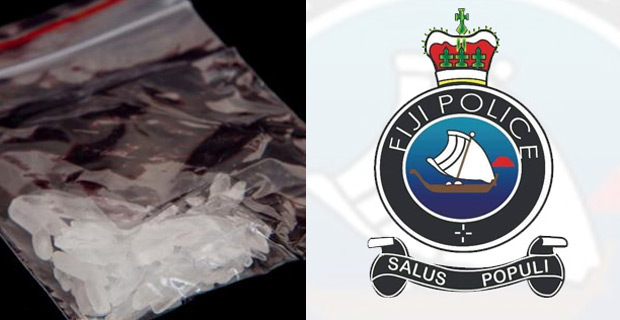
The woman arrested for unlawful possession of methamphetamine following a joint controlled operation between the Fiji Police Force and Fiji Revenue and Customs Service has been charged.
The accused was arrested after she had picked up a parcel containing Methamphetamine concealed inside a bottle of peanut butter sent from America.
The accused has been charged with one count of Unlawful Possession of Illicit Drugs: Contrary to Section 5 (a) of the Illicit Drugs Control Act, 2004 and one count of Unlawful Importation of Illicit Drugs: Contrary to Section 4 (1) of the Illicit Drugs Control Act, 2004.
The woman allegedly imported 115 grams of methamphetamine valued at $115,000 through Parcel Post.
She will be produced in the Suva Magistrates Court today.
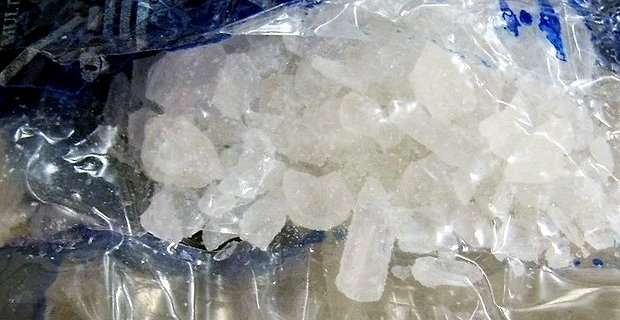
The woman arrested for unlawful possession of methamphetamine following a joint controlled operation between the Fiji Police Force and Fiji Revenue and Customs Service will front the Suva Magistrates Court in the next hour.
She was arrested after she had picked up a parcel containing Methamphetamine concealed inside a bottle of peanut butter sent from America.
The woman has been charged with one count of Unlawful Possession of Illicit Drugs: Contrary to Section 5 (a) of the Illicit Drugs Control Act, 2004 and one count of Unlawful Importation of Illicit Drugs: Contrary to Section 4 (1) of the Illicit Drugs Control Act, 2004.
The woman allegedly imported 115 grams of methamphetamine valued at $115,000 through Parcel Post.
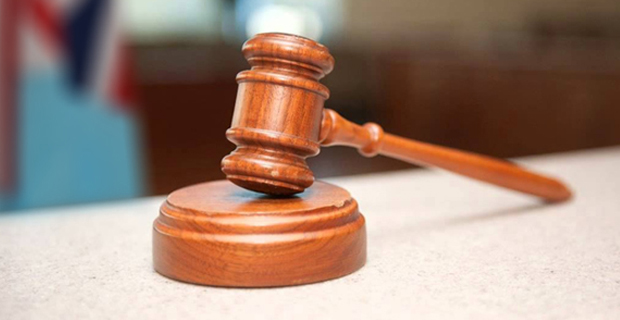
A Suva lawyer was taken into police custody from a house in Nailuva Road yesterday afternoon after substances believed to be marijuana and methamphetamine were allegedly seized from his possession.
Police say a woman was also arrested from the house.
The two remain in police custody and the drugs have been sent for analysis.
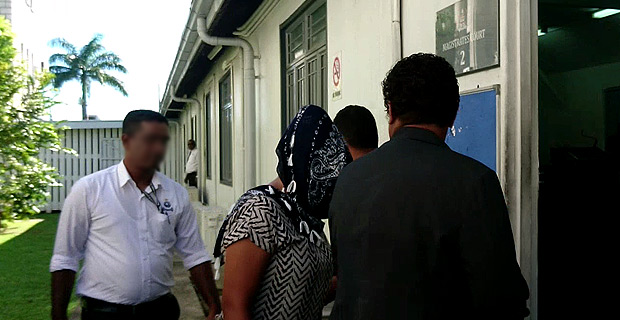
Mereseini Asinate Luisa Ledua who allegedly imported 101.4 grams of methamphetamine has been remanded in custody by the Suva Magistrates Court.
She was arrested last Friday after picking up the parcel at the Suva Post Office.
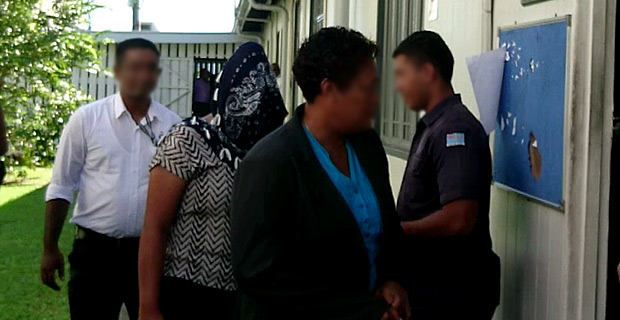
The drugs were concealed inside a bottle of peanut butter which was sent from America.
The methamphetamine was valued at $115,000.
Ledua works as a clerical officer for a construction company in Nadi.
Magistrate Prakash has requested for a formal bail application saying the court needs to make an informed decision on whether to consider bail or not.
The Prosecution has not objected to bail but have requested for strict bail conditions.
The Legal Aid lawyer informed court that Ledua was willing to surrender her passport and was in a position to provide cash bail.
Magistrate Prakash also said this was a Category 2 offence.
This means Ledua could face up to 10 years in prison if convicted.
Ledua is charged with one count of Unlawful Possession of Illicit Drugs and one count of Unlawful Importation of Illicit Drugs.
The case has been adjourned to Wednesday.
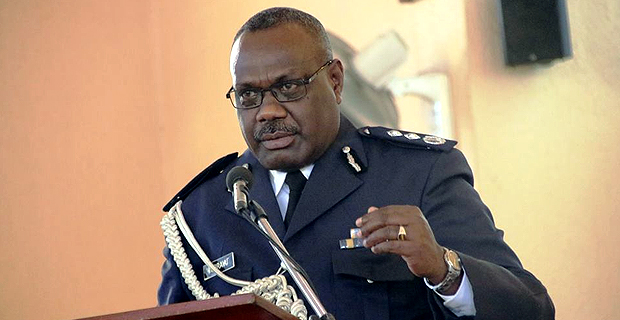
Deputy Police Commissioner, Rusiate Tudravu has given an assurance that their officers are well equipped to carry out drug raids, especially at meth labs where explosions can take place or where they may be exposed to harmful chemicals.
The Fiji Police Force was allocated $177.8 million in the 2019/2020 National Budget of which $800,000 is provided to undertake special drug operations.
He says drug cases are now an issue of national concern and this is why the Fiji Police Force will be setting up a Narcotics Bureau.
He says this is why the Force is investing in training their officers on dealing with drug cases.
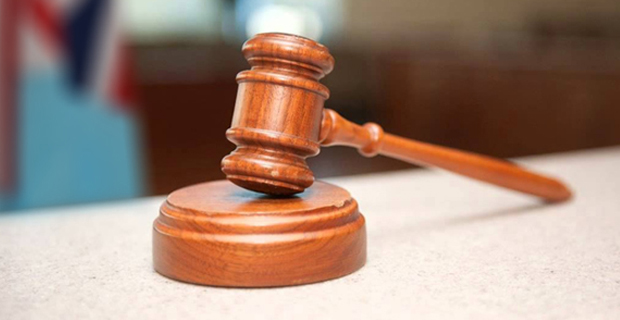
A Suva lawyer who is already facing charges of being in possession hard drugs and a woman in her 30s will be produced in the Suva Magistrates Court today after they were allegedly found with illicit substances confirmed to be methamphetamine.
The two were arrested following a raid at a home in Nailuva Road on Sunday.
The two both face a count of unlawful possession of illicit drugs.
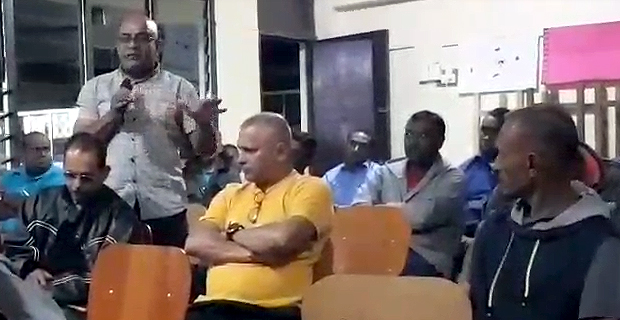
Residents of Navua have raised serious concerns with the Parliamentary Standing Committee on Justice, Law and Human Rights regarding the blatant selling of drugs in Navua and children being at high risk after a man who raped his mother coming back into their community.
While making his submission on the Sex Offenders Registration Bill, a Navua resident says the increased prevalence of hard drugs will also result in the increase in sex offences.
He says this is a worrying concern.
A few of the Navua residents also raised concerns about a man who has served time for raping his mother, and is back in the community. They say that they are concerned about their children and the community should work together to monitor this person.
Chairperson of the Parliamentary Committee on Justice, Law and Human Rights, Alvick Maharaj says the Sex Offenders Registration will give some comfort to everyone in the community.

A Suva lawyer who is already facing charges of being in possession of hard drugs, and a woman in her 30s will appear in the Suva Magistrates Court today after they were allegedly found with illicit substances confirmed to be methamphetamine.
The two were arrested following a raid at a home in Nailuva Road on Sunday.
The two both face a count of unlawful possession of illicit drugs.
ADVERTISEMENT
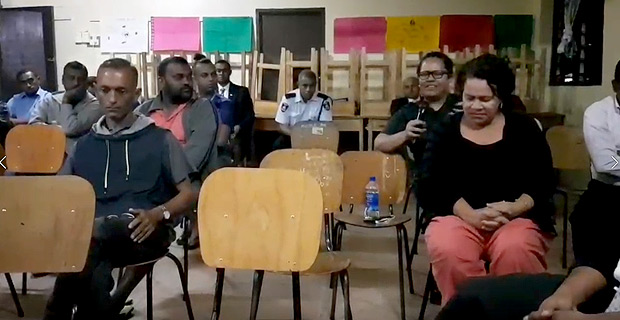
The Fiji Police Force will look into the serious concerns raised by Navua residents that there are about 6 to 7 drug dealers openly selling drugs around the Navua Town area.
While speaking during the public submissions of the Parliamentary Committee on Justice, Law and Human Rights, a Navua resident said that everyone including the Police know about these drug dealers, however she claims that nothing is done by the Police officers in the area.
She says that if anyone goes to Navua now, they can find the dealers on the streets.
When contacted by Fijivillage, Police confirmed that their Divisional Commander Southern will be looking into this issue.
Spokesperson, Ana Naisoro says they have encouraged members of the public to come forward with information about drug related activities and therefore Police will not take this lightly.
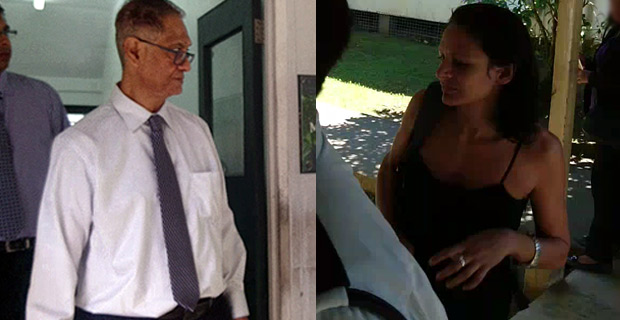
Prominent Suva lawyer Shazran Abdul Lateef and Zoe Moore who were allegedly found with drugs have been remanded in custody.
The bail ruling will be done tomorrow in the Suva Magistrates Court.
Lateef and Moore are both charged with one count each of being found in possession of 7.89 grams of methamphetamine, one count each of being found in possession of 12.49 grams of cocaine and one count each of being found in possession of 2.5 grams of marijuana.
They were arrested following a raid at a home in Nailuva on Sunday.
Lateef is represented by Filimoni Vosarogo and Moore is been represented by Legal Aid.
While making an oral submission for bail, Vosarogo says that these are all allegations only.
Vosarogo says that the house where the illicit drugs were found has other occupants.
He also questioned the court as to what evidence does police have against Lateef.
Vosarogo says that the charges are badly worded where it was stated that Lateef and Moore were jointly found together in possession.
He says that the prosecution cannot say that the drugs belong to Lateef because nowhere in the charges, it was stated that they were in possession of the drugs nor was it found in his room.
Moore’s lawyer also told the court that the information that the Police Prosecutor had shared that Moore has a pending case in Nasinu court of the same nature is wrong.
He says that Moore does not have a pending case of any nature.
The lawyer says that there is no reason why she should be rejected bail since this is her first court appearance with these charges.
Police Prosecutor, Sergeant Prarthna Devi objected to bail, and says that Lateef and Moore have other pending similar cases before the court.
Sergeant Devi says that the two lawyers should make a formal bail application.
The case has been adjourned to 9.30am tomorrow.
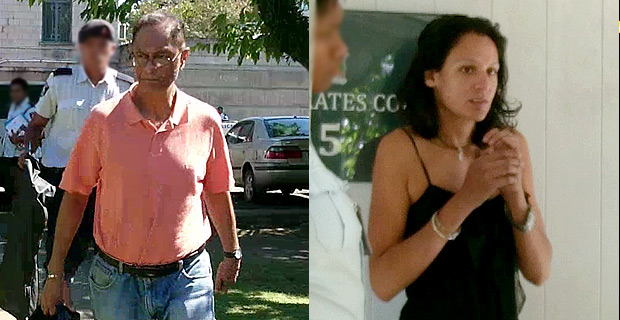
The bail ruling of prominent Suva lawyer Shazran Abdul Lateef and Zoe Moore who were allegedly found with drugs will be delivered by Magistrate Jioji Boseiwaqa later this morning.
Lateef and Moore are in remand.
They are both charged with one count each of being found in possession of 7.89 grams of methamphetamine, one count each of being found in possession of 12.49 grams of cocaine and one count each of being found in possession of 2.5 grams of marijuana.
They were arrested following a raid at a home in Nailuva on Sunday. Lateef is represented by Filimoni Vosarogo and Moore is represented by Legal Aid.
Police Prosecutor, Sergeant Prarthna Devi has objected to bail, and says that Lateef and Moore have other similar cases pending before the court.
This is the fourth case where Lateef has been charged with possession of illicit drugs and produced in court. He was granted bail in all the other cases.
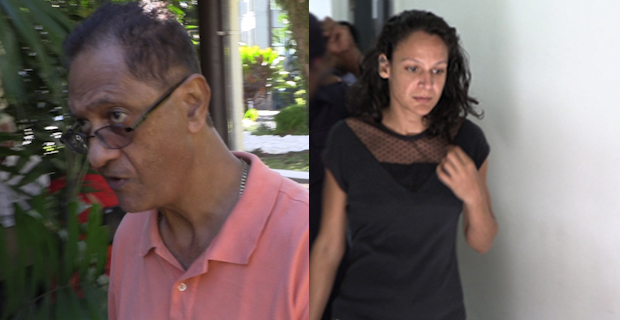
The bail ruling for Suva lawyer Shazraan Abdul Lateef and Zoe Moore who have been charged with being in possession of illicit drugs, will be delivered this hour.
Lateef and Moore are both charged with one count each of being found in possession of 7.89 grams of methamphetamine, one count each of being found in possession of 12.49 grams of cocaine and one count each of being found in possession of 2.5 grams of marijuana.
They were arrested following a raid at a home at Nailuva Road on Sunday.
This is the fourth case where Lateef has been charged and produced in court after being allegedly found with drugs.
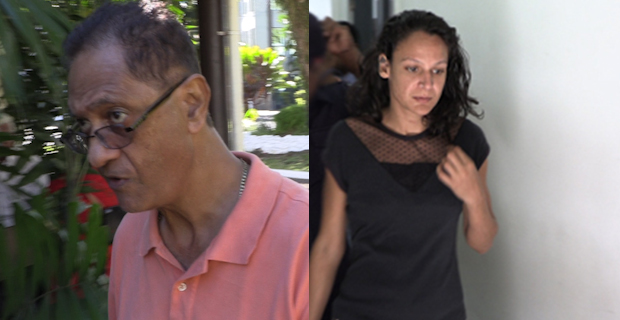
Suva lawyer, Shazran Abdul Lateef and Zoe Moore who were allegedly found with drugs have been granted bail by Suva Magistrate Jioji Boseiwaqa.
In his bail ruling delivered in the last hour, Magistrate Boseiwaqa said the prosecution submitted that Moore and Lateef have reoffended while on bail.
Magistrate Boseiwaqa noted that both of them have not absconded bail.
The Magistrate also said the court's diary is booked out and both Lateef and Moore could be in remand for 1 year before the trial.
Magistrate Boseiwaqa also highlighted concerns raised by Lateef and Moore about the conditions of the Suva Remand Centre.
Lateef had raised through his lawyer, Filimoni Vosarogo that he had to be moved to the Infirmary because of his old age last night.
Moore had raised through her Legal Aid lawyer that she slept with six other people on the floor and they all used one blanket.
Lateef and Moore have both been granted bail with strict bail conditions.
Those conditions include cash bail of $500 each, two sureties each with a surety bond of $500 and report to the Raiwaqa Police Station on the first Saturday of every month.
They are also on a curfew which is from 6pm to 6am daily.
Lateef and Moore are both charged with one count each of being found in possession of 7.89 grams of methamphetamine, one count each of being found in possession of 12.49 grams of cocaine and one count each of being found in possession of 2.5 grams of marijuana.
They were arrested following a raid at a home at Nailuva Road on Sunday.
This is the fourth case where Lateef has been charged and produced in court after being allegedly found with drugs. He was also granted bail in the previous cases.
The case has been adjourned to 12th September this year.
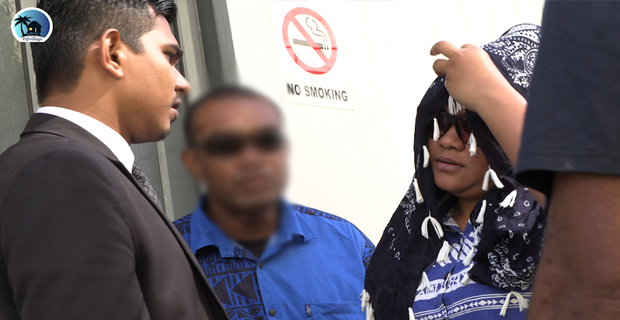
Mereseini Asinate Luisa Ledua who allegedly imported 101.4 grams of methamphetamine has been granted bail by Suva Magistrate Deepika Prakash.
She was granted bail with strict conditions which included paying a cash bail of $1,000 and providing two sureties.
A stop departure has also been issued against Ledua.
Ledua was arrested last Friday after picking up the parcel at the Suva Post Office.
The drugs were concealed inside a bottle of peanut butter which was sent from America.
The methamphetamine was valued at $115,000.
Ledua is charged with one count of unlawful Possession of Illicit Drugs and one count of unlawful Importation of Illicit Drugs.
She will take her plea on the 31st of this month.
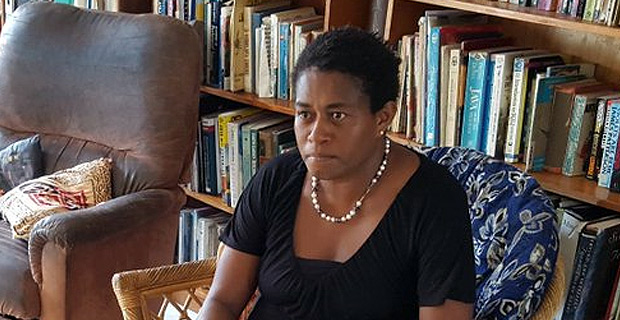
People need to realize that hard drugs like methamphetamine are highly addictive and reports continue to show that those who get into these hard drugs do not really know that there is a high possibility that they will get addicted to it.
Serious concerns continue to be raised that methamphetamine and other hard drugs are now readily available and Police are calling on people to contact them if they have any information to fight this deadly drug.
Methamphetamine is extremely addictive and many people are uninformed of the dangers and addictive potential of the drug and are more likely to try it despite the severe consequences of developing an addiction.
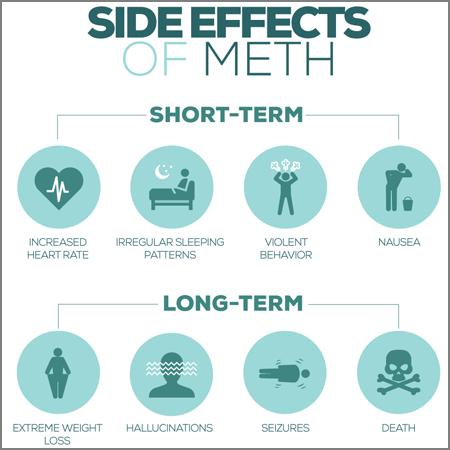
Methamphetamine addiction and its use is particularly dangerous as it is associated with drug‑induced psychosis, violence, and erratic behaviour. Meth does not allow people to sleep, so users are often awake for several days at a time and lose touch with reality.
Experts say many people initially use methamphetamine when under the influence of alcohol and thinking they would not end up depending on it ‑ but just one time can be enough to start the roller coaster ride of addiction.
Meanwhile, Australia had already said 4 years ago that across Australia, officials are talking about soaring rates of meth addiction, warning that levels of meth use have reached pandemic proportions. Crystal methamphetamine or “ice” is already ravaging Australia’s communities at every level and has officials and residents alike worried about what can be done.
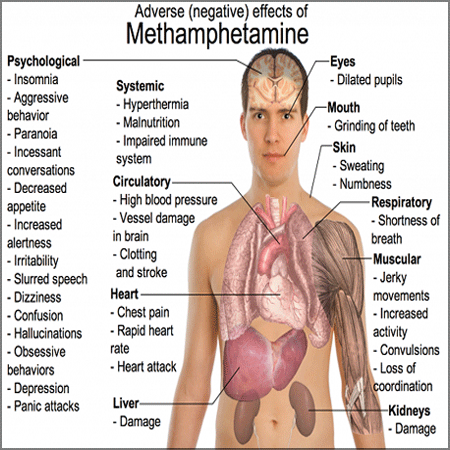
A large group of people who get into meth are young executives, university students and the unemployed who get targetted by friends and associates who are already on meth.
Psychiatrist, Selina Kuruleca says it is difficult to reverse the permanent damage of meth, cocaine and other hard drugs because they are chemicals and not meant for ingestion.
She says these heavy hard drug users specifically have memory loss and it can induce periods of prolonged blackouts. They can blackout for days on end and not even know what is happening.
Kuruleca adds that brain damage is permanent and it is hard to get the person clean again.
She says that part of this permanent damage is that a drug addict is unable to control some of their very basic functions.
She says the people that are negatively affected the most are those that are immediate family members of the drug addict, for example if the drug addict does not get his or her way with money, the drug addict tends to hurt their own family members and take it forcefully. These people will get violent when they need money to get the drugs and will also use manipulative tactics to get what they want.
Kuruleca says a lot of times, people want to go straight to the solution but they need to be a lot more pro-active and train people on how to say no, train parents on how to talk to their children, and also preparing children mentally and spiritually before they leave home.
Kuruleca adds that we have a real problem because we do not have facilities like a drug rehabilitation centre and they are trying to get people trained to be able to manage problems when a hard drug user comes to any health facility.
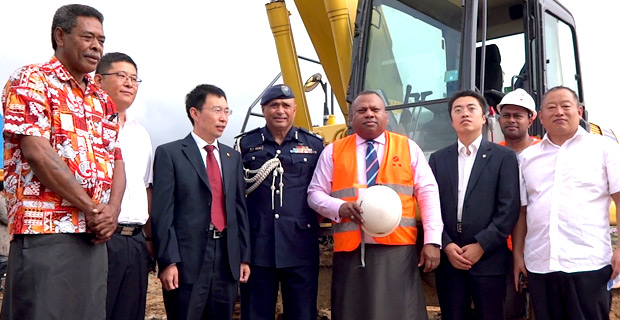
Minister for Foreign Affairs, National Security and Defence Inia Seruiratu says people need to know that Police Officers within the Eastern Division and overall in Fiji are vigorously fighting the war on drugs so that the Nausori‑Nakasi corridor is not known as the meth corridor.
Speaking at the ground breaking ceremony for the new Nakasi Police Station, Seruiratu says the fact that Nakasi contributed 19 percent of the crime in the Eastern Division last year should ring alarm bells.
It will take 85 weeks to construct the new Nakasi Police Station which is located next to the new Nakasi Health Centre and the new Nakasi Fire Station which is currently being built.
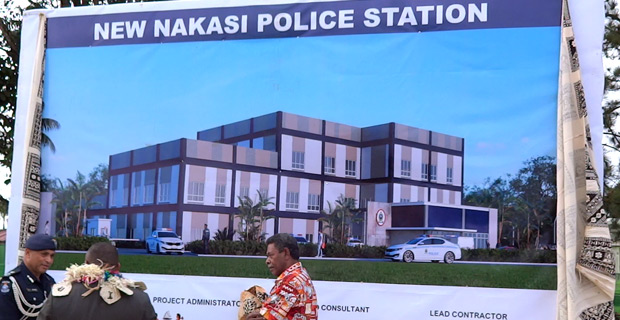
The project includes the construction of residential barracks.
The cost of the project is $35 million and it is funded by the government.
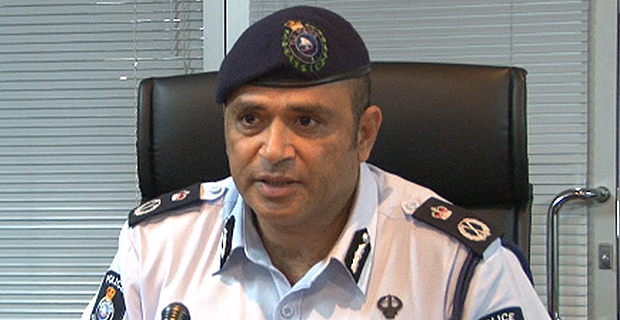
Police Commissioner Sitiveni Qiliho says officers that will be included in the soon to be established Narcotics Unit will report directly to him.
He says this is something that has to be set up right to deal with dirty cops.
Qiliho has stressed that the selection process of the officers will be stringent.
Qiliho says he is already looking at some facilities for the new Narcotics Unit.

Corrections Officers have discovered a small plastic containing white substances believed to be methamphetamine placed inside a Bible during a search at the Korovou Center.
Police say the substance which has been sent for testing allegedly belongs to an inmate.
Contraband items like methamphetamine, sachets of marijuana, more than 50 mobile phones as well as phone chargers were found by Fiji Corrections Service officers at the Suva Remand Centre in the last three weeks.
Fiji Corrections Service Commissioner Commander Francis Kean had earlier said the smuggling of contraband items into their remand and convict centres was a daily challenge.

A 23-year-old man who was allegedly found with methamphetamine during a raid on Wednesday will be produced in the Nasinu Magistrates Court today.
He has been charged with one count of unlawful possession of illicit drugs.
Police say the raid was conducted at his home in Drodrolagi Place Makoi where packets of methamphetamine and smoking apparatus were found.
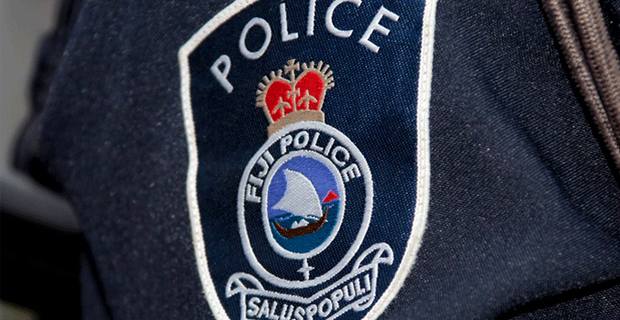
The Fiji Police Force Drugs and Substance Abuse Unit Officer, Alisi Lalabalavu says the Zombie drug is already in the country and Police are working with other authorities to ensure the issue is addressed and drug rehabilitation centres are in place.
While speaking at the Vodafone ATH Foundation Workshop, Lalabalavu says 40 million dollars worth of hard drugs were seized by Police last year.
She also says Zombie is the same drug that has caused 25 deaths in New Zealand.
Lalabalavu says that there has been a huge increase in methamphetamine cases where there were 148 arrests in 2012, 1,440 drug seizures in 2018 and the number is still increasing so far this year.
The ABC has reported that the Zombie drug which is scientifically known as Desomorphine or Flakka on the streets has led to some users attempting to bite into the flesh of others in Australia.
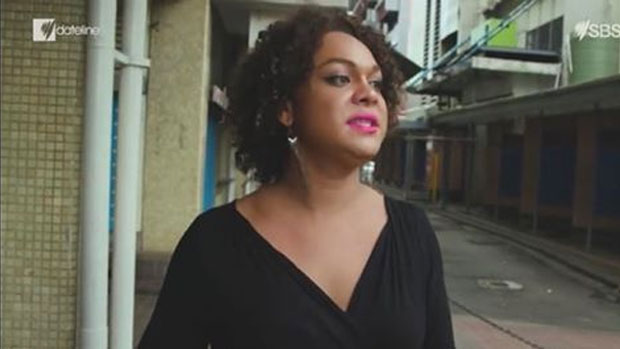
A 22-year-old prostitute, Elaine Monroe, who spoke out in a documentary on SBS that she and other prostitutes took methamphetamine every night and that it was easily available on the streets in Suva, has now said that she is in danger.
Elaine says her life and her family are in danger after the airing of the documentary as they have received death threats.
Elaine is a former meth addict who Drug-Free World helped get clean.
She also confirmed that she and other prostitutes always injected methamphetamine every night at the short cut from Rewa Street to Dhanji Street in Samabula, the same short cut used by primary and high school students from a nearby school in the day.
She says the used syringes and empty packets are always just thrown there.
Monroe says her family has been receiving death threats because of the video.
She says people in two vans visited her brother in Nadi yesterday and threatened to visit more if they went to the police.
Monroe says the brother and the family did not lodge any complaint because they are scared.
She says meth has taken over the streets and has had the younger generation locked in.
A drug dealer also said that he is selling methamphetamine for 50 to 100 dollars.
He confirms in the documentary that meth or ice can easily be bought on the streets in all towns.
The dealer says this is easily available for the last two years.
He also says taxi drivers, street workers late at night, party people and even kids are using it.
They also say prostitutes as young as 16 years old are also on ice.
Hard drugs like methamphetamine are highly addictive and reports continue to show that those who get into these hard drugs do not really know that there is a high possibility that they will get addicted to it.
Methamphetamine is extremely addictive and many people are uninformed of the dangers and addictive potential of the drug and are more likely to try it despite the severe consequences of developing an addiction.
Methamphetamine addiction and its use is particularly dangerous as it is associated with drug-induced psychosis, violence, and erratic behaviour.
Meth does not allow people to sleep, so users are often awake for several days at a time and lose touch with reality.
Experts say many people initially use methamphetamine when under the influence of alcohol and thinking they would not end up depending on it - but just one time can be enough to start the roller coaster ride of addiction.
Meanwhile, Australia had already said 4 years ago that across Australia, officials are talking about soaring rates of meth addiction, warning that levels of meth use have reached pandemic proportions.
Crystal methamphetamine or “ice” is already ravaging Australia’s communities at every level and has officials and residents alike worried about what can be done.
A large group of people who get into meth are young executives, university students and the unemployed who get targetted by friends and associates who are already on meth.
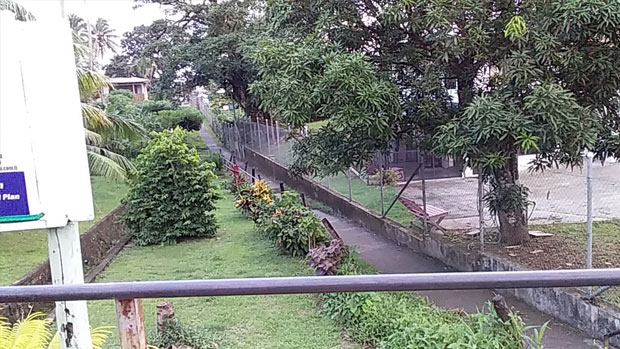
Police are already looking into the information coming through about drug addicts using a bypass or short cut from Rewa Street to Dhanji Street at night to inject methamphetamine.
Commissioner, Sitiveni Qiliho says their call also continues for anyone with information to come forward to Police.
Qiliho says their focus remains on the source of drugs, the dealers and end-users.
He says all these are illegal acts.
Qiliho says some end users are making excuses that they just have the drugs.
He stresses that being in possession of an illicit drug is illegal and people will face the full brunt of the law.
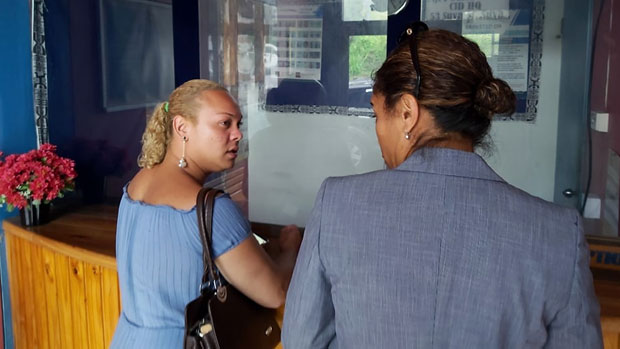
A 22-year-old sex worker who spoke out in a SBS documentary about her and other sex workers taking easily available methamphetamine every night has filed a police report about the death threats she and her family are now receiving after the airing of the documentary.
Elaine Monroe who is a former meth addict filed the report at Totogo Police Station yesterday.
She says people in two vans visited her brother in Nadi on Thursday and threatened to visit more if they went to the Police.
Police Spokesperson Ana Naisoro says the report has been referred to Nadi because the report is about threats made against one of the complainant’s family members in Nadi.
Monroe had also confirmed that she and other prostitutes always injected methamphetamine every night at the short cut from Rewa Street to Dhanji Street in Samabula, the same short cut used by primary and high school students from a nearby school in the day.
She says the used syringes and empty packets are always just thrown there.
Click here for stories on the Drugs Situation in Fiji
Stay tuned for the latest news on our radio stations

